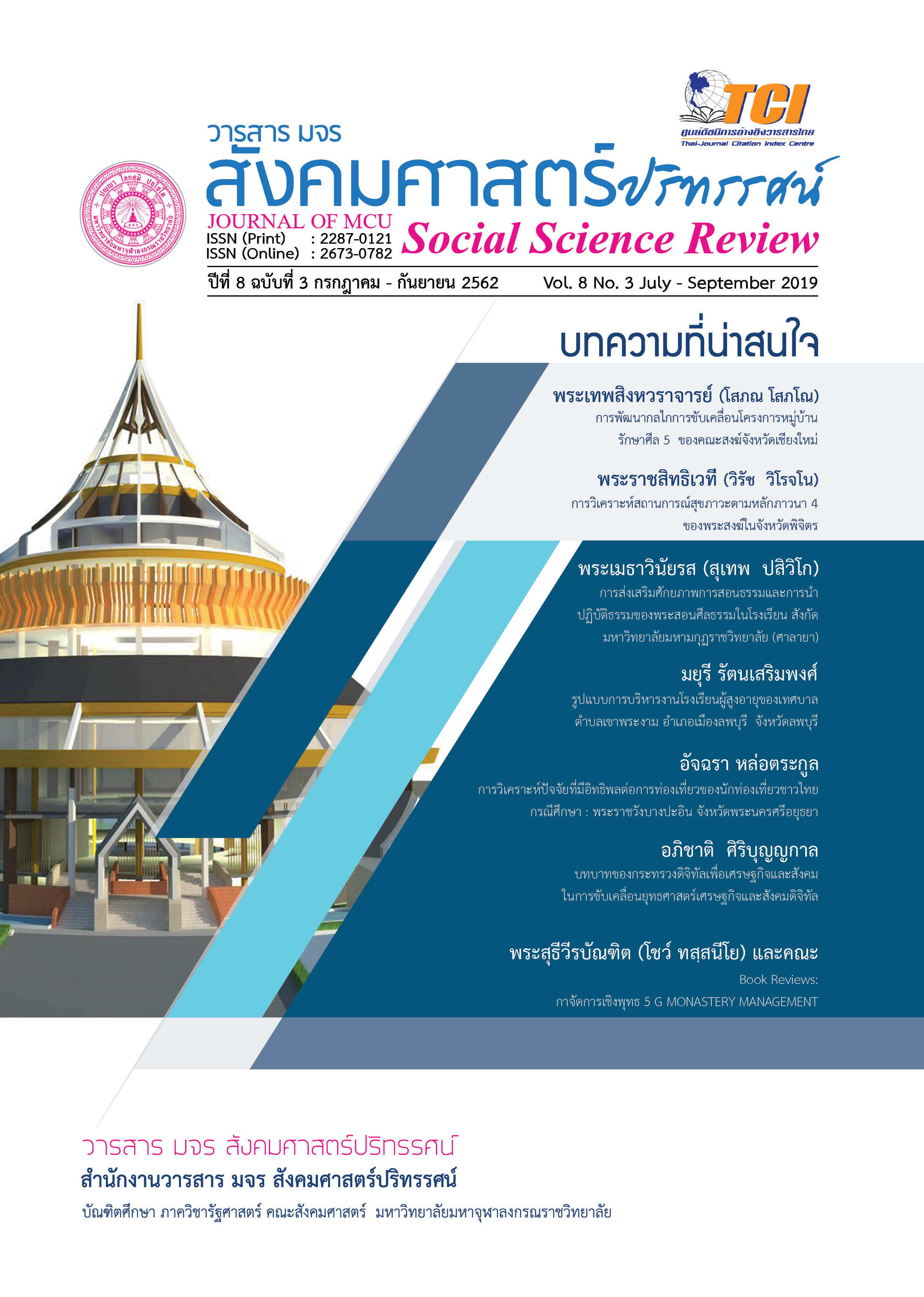การส่งเสริมบทบาทพระสงฆ์ในการป้องกันปัญหายาเสพติด ให้นักเรียนระดับมัธยมศึกษา จังหวัดสระบุรี
คำสำคัญ:
การส่งเสริม, พระสงฆ์, ปัญหายาเสพติด, การป้องกันปัญหายาเสพติดบทคัดย่อ
บทความนี้มีวัตถุประสงค์เพื่อ 1) ศึกษาสภาพทั่วไปของพระสงฆ์ในการป้องกันปัญหายาเสพติด 2) ศึกษาปัจจัยที่ส่งผลต่อบทบาทพระสงฆ์ในการป้องกันปัญหายาเสพติด 3) นำเสนอรูปแบบการส่งเสริมบทบาทพระสงฆ์ในการป้องกันปัญหายาเสพติด เป็นงานวิจัยแบบผสาน เก็บข้อมูลด้วยการสัมภาษณ์เชิงลึกจากผู้ให้ข้อมูลสำคัญจำนวน 21 รูปหรือคน สนทนากลุ่มเฉพาะ กับผู้ทรงคุณวุฒิจำนวน 10 รูปหรือคน วิเคราะห์ข้อมูลโดยการวิเคราะห์เนื้อหาเชิงพรรณนาและการวิจัยเชิงปริมาณ โดยการแจกแบบสอบถามกับกลุ่มตัวอย่าง คือ นักเรียนมัธยมศึกษาจังหวัดสระบุรี จำนวน 367 คน วิเคราะห์ข้อมูลด้วยสถิติค่าความถี่ ค่าร้อยละ ค่าเฉลี่ย ค่าส่วนเบี่ยงเบนมาตรฐาน
ผลการวิจัยพบว่า
- สภาพทั่วไป พบว่า มีการจัดอบรมคุณธรรมจริยธรรมโดยให้นักเรียนมีส่วนร่วมผ่านการจัดกิจกรรมที่หลากหลายเพื่อเสริมสร้างการป้องกันและแก้ไขปัญหายาเสพติดต่อเยาวชน
- ปัจจัยที่ส่งผลต่อบทบาทพระสงฆ์ในการป้องกันปัญหายาเสพติดได้แก่ 4M คือ คน (Man) เงิน (Money) วัสดุอุปกรณ์ (Material) และการจัดการ (Management)
- รูปแบบการส่งเสริมบทบาทพระสงฆ์ในการป้องกันปัญหายาเสพติด คือ 1) การให้ข่าวสารโดยการเผยแผ่หลักธรรมควบคู่กับการรณรงค์ประชาสัมพันธ์ข้อมูลเรื่องยาเสพติดโดยใช้เทคโนโลยีเป็นช่องทางสื่อสารให้นักเรียนได้รับรู้ 2) การให้การศึกษาด้านจิตใจหรือความรู้สึกโดยให้นักเรียนมีส่วนร่วมจัดกิจกรรมทางพระพุทธศาสนาเพื่อเป็นเกาะป้องกันยาเสพติด 3) การเป็นที่ปรึกษาโดยเปิดโอกาสให้นักเรียนนำปัญหามาขอคำปรึกษา เป็นต้น
เอกสารอ้างอิง
Kannika Kanjanada and the faculty. "Ethics promotion process Suitable for students of Maejo University - Phrae Chaloem Phra Kiat Phrae Province ". Research Report. Chiang Mai: Maejo University. 2010.
Kosol Inthawong. "Development of learning styles to prevent and solve drug problems in educational institutions Under the Eastern Vocational Institute ". Doctor of Philosophy Thesis Human Resource Development Branch. Graduate School: Ramkhamhaeng University. 2007. Abstract page.
Phatchara Iambun. "Development of a model for the energizing campaign and education for the control of alcohol consumption for children and youth in educational institutions". Ph.D. Communication Arts. Faculty of Communication Arts: Chulalongkorn University. 2010. Abstract page.
Suchada Soonthornsarathul. "Cooperation model of houses. temples. schools and communities In cultural immunity for children and youth in the Bangkok metropolitan area ". Doctor of Philosophy Thesis Department of Cultural Sciences. Graduate School: Mahasarakham University. 2009
Suttarak Chaiyarak and Faculty. "Alcohol Drinking Behavior of Students at Suranaree University of Technology. Academic Year 2008". Research Report. Nakhon Ratchasima: Suranaree University of Technology. 2010. Abstract page.
Wanchanok Chanthum. "Self-development. ways to prevent smoking among students using participatory processes: a case study of opportunity extension schools in Kalasin". Ph.D. thesis Applied Behavioral Science Research. Graduate School: Srinakharinwirot University. 2005.
ดาวน์โหลด
เผยแพร่แล้ว
รูปแบบการอ้างอิง
ฉบับ
ประเภทบทความ
สัญญาอนุญาต
ลิขสิทธิ์ (c) 2019 วารสาร มจร สังคมศาสตร์ปริทรรศน์

อนุญาตภายใต้เงื่อนไข Creative Commons Attribution-NonCommercial-NoDerivatives 4.0 International License.
เพื่อให้เป็นไปตามกฎหมายลิขสิทธิ์ ผู้นิพนธ์ทุกท่านต้องลงลายมือชื่อในแบบฟอร์มใบมอบลิขสิทธิ์บทความให้แก่วารสารฯ พร้อมกับบทความต้นฉบับที่ได้แก้ไขครั้งสุดท้าย นอกจากนี้ ผู้นิพนธ์ทุกท่านต้องยืนยันว่าบทความต้นฉบับที่ส่งมาตีพิมพ์นั้น ได้ส่งมาตีพิมพ์เฉพาะในวารสาร มจร สังคมศาสตร์ปริทรรศน์ เพียงแห่งเดียวเท่านั้น หากมีการใช้ภาพหรือตารางหรือเนื้อหาอื่นๆ ของผู้นิพนธ์อื่นที่ปรากฏในสิ่งตีพิมพ์อื่นมาแล้ว ผู้นิพนธ์ต้องขออนุญาตเจ้าของลิขสิทธิ์ก่อน พร้อมทั้งแสดงหนังสือที่ได้รับการยินยอมต่อบรรณาธิการ ก่อนที่บทความจะได้รับการตีพิมพ์ หากไม่เป็นไปตามข้อกำหนดเบื้องต้น ทางวารสารจะถอดบทความของท่านออกโดยไม่มีข้อยกเว้นใดๆ ทั้งสิ้น





